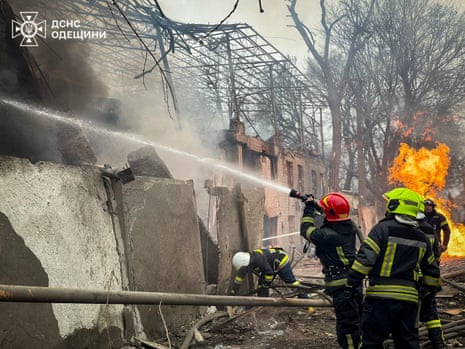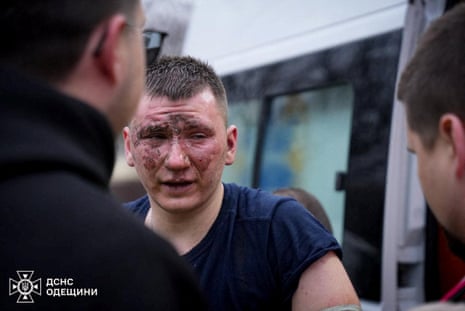The number of people killed due to the Russian missile attack has increased to 14, Oleg Kiper, the head of the region, has said.
Local media reported that among the dead are local residents, a doctor and a rescuer. Another 46 people, including seven employees of the State Emergency Service, were injured.
A day of mourning in the region has been declared for tomorrow according to state broadcaster Suspilne.

Earlier reports indicated that rescuers were on the scene after a fire broke out from an initial strike when the location was targeted again.

Dmitry Medvedev, Russian security council deputy chairman and hawkish ally of the Russian president, has cast his vote today.

Dmytro Lubinets, the Ukrainian parliament commissioner for human rights has commented on today’s missile strike in Odesa. He writes on social media:
Odesa. Russia has once again launched a missile attack on civilians. After the first hit, rescuers arrived at the scene but were targeted as Russia struck again. 14 people were killed, including local residents, a medical worker and a rescuer. 46 people, including seven State Emergency Service personnel, were injured. The world should know. The world should not forgive! The terrorist state must be held accountable for its cynical war crimes against Ukrainians.
The number of people killed due to the Russian missile attack has increased to 14, Oleg Kiper, the head of the region, has said.
Local media reported that among the dead are local residents, a doctor and a rescuer. Another 46 people, including seven employees of the State Emergency Service, were injured.
A day of mourning in the region has been declared for tomorrow according to state broadcaster Suspilne.

Earlier reports indicated that rescuers were on the scene after a fire broke out from an initial strike when the location was targeted again.

Russian state investigators in Moscow said on Friday they had opened a criminal case against a woman who poured green dye into a ballot box to try to disrupt voting in the country’s presidential election.
CCTV footage released of the incident by the RIA state news agency showed a young woman depositing her voting slip before calmly pouring a green liquid into the transparent plastic ballot box.
A policeman is seen detaining her immediately afterwards in the footage.
The woman, who was not named, was later charged with “obstructing the exercise of electoral rights or the work of election committees,” Reuters reports the Investigative Committee’s press service said.
Russia’s defence ministry has issued handout photos of defence minister Sergei Shoigu casting his ballot in today’s election at an undisclosed location in Rostov region.


The death toll from a Russian missile strike on Ukraine’s southern post city of Odesa on Friday has risen from two to eight, the Ukrainian prosecutor’s office said. More than 20 people were injured.
The state emergency service has issued some images from the scene.


It has just gone 1.30pm in Kyiv, and 2.30pm in Moscow. Here are the latest headlines …
-
A Russian missile attack on Ukraine’s southern city of Odesa on Friday killed at least two people and wounded others, the regional governor said. A medic and a rescuer were killed when a second strike hit a location where they were trying to extinguish fire caused by an initial impact. At least 20 people have been wounded.
-
German chancellor Olaf Scholz has welcomed French president Emmanuel Macron to Berlin’s chancellery. Poland’s prime minister Donald Tusk will join them later amid tensions over Russian military advances in Ukraine and a US congressional refusal to approve substantial further military aid to Kyiv.
-
In a combative TV interview on Thursday night, Macron told the French public “The security of Europe and the French is at stake in Ukraine. If Russia wins, the lives of the French change and Europe’s credibility is reduced to zero. Who can think that Vladimir Putin will stop there?”
-
114 million Russians are eligible to vote in a presidential contest that began today, and will end on Sunday with an inevitable victory for president Vladimir Putin. He is running against Communist Nikolai Kharitonov, Leonid Slutsky, leader of the nationalist Liberal Democratic Party, and Vladislav Davankov of the New People party. Two anti-war candidates, Boris Nadezhdin and Yekaterina Duntsova were barred from running by the electoral commission.
-
Voting is also taking place in the four occupied regions of Ukraine which Russia claims to have annexed despite its forces only partially controlling the territory. Ukraine has said the election there is illegal. The Russian-installed head of the occupied Donetsk region, Denis Pushilin, has said that “more than half of the voters voted early” in his region, reducing security concerns. However, he said “The enemy is trying by any available means of disrupting and discrediting our elections.”
-
The regional governor of Belgorod announced on Telegram that one person has been killed by Ukrainian shelling in the Russian city of Grayvoron in the region. Earlier Russia claimed it had thwarted attempts by Ukraine to stage cross-border raids into the territory, while a senior Ukrainian intelligence official claimed that Kursk and Belgorod regions were “active combat zones”.
-
Ukraine claims it shot down all 27 “Shahed” drones with which the Russian army attacked overnight, however there were missile strikes in Kharkiv, Poltava and Donetsk regions, and two people were reported killed by shelling in Sumy region.
-
Ukraine claims to have attacked an oil refinery in Kaluga region with drones, causing damage. Russian authorities said air defences had shot down the drones, and there was “no infrastructure damage or casualties”.
-
Russia’s Federal Security Service (FSB) said on Friday that a Russian national had been detained in Moscow on suspicion of treason and had confessed to assembling and launching drones on behalf of Ukraine.
A Russian missile attack on Ukraine’s southern city of Odesa on Friday killed at least two people and wounded others, the regional governor said.
“There are also seriously injured among the medics and rescuers. The total number of victims is being specified,” Reuters reports Oleh Kiper, the governor, said on Telegram messenger.
He added that the two killed were a medic and a rescuer, who rushed to the site after the first strike. Ukraine’s air force had announced a ballistic missile threat ahead of the blasts in the city.
Local media reported that “civilian infrastructure was damaged, 20 people were injured, five of whom were rescuers”. It said that a fire broke out at the initial point of impact, and then the rescuers were killed when it was struck again as they sought to extinguish the flames.
Citing rescue services, Suspilne reported “The impact also damaged ten private houses, a service station, a low-pressure gas pipeline and two fire and rescue vehicles. Currently, the fire on the gas pipeline and in a private house is being extinguished.”
German chancellor Olaf Scholz has just welcomed French president Emmanuel Macron outside Berlin’s chancellery. They briefly posed for photos but did not have any words for the media.
France’s president Emmanuel Macron caused consternation on 26 February when he refused to rule out sending troops to Ukraine, later clarified as trainers, but in a dramatic TV interview last night he refused to retreat, saying he would rule nothing out in a bid both to maintain strategic ambiguity and to convince Vladimir Putin that Russia is engaged in a war that Europe will not allow it to win.
Quoting Winston Churchill and Charles de Gaulle at various points in the interview he said:
The security of Europe and the French is at stake in Ukraine. If Russia wins, the lives of the French change and Europe’s credibility is reduced to zero. Who can think that Vladimir Putin will stop there?
Although he refused to describe Russia as an enemy, but instead as an “adversary”, he said Russia is already engaged in a hybrid war in Europe. He also rejected claims that his rhetoric risked escalation.
“We must not be weak,” Macron argued. “We have set too many limits with words,” Macron said. “Two years ago we said we would never send tanks. Then we did. Two years ago we said we would never send medium-range missiles. Then we did.”
He defended his abandonment of his original dialogue with Putin by saying “the changing situation on the ground today requires a new approach.”
“The Ukrainian counter-offensive did not go as planned,” the president admitted, highlighting the stalemate on the fronts, the lack of recruits and shells in the Ukrainian camp. At the same time, he said, the Kremlin regime “has become significantly tougher,” a reference to the death of Alexei Navalny.
Patrick Wintour is the Guardian’s diplomatic editor
The three leading military powers on mainland Europe – France, Germany and Poland – are due to meet in an emergency session in Berlin on Friday in a bid to end debilitating tensions over the response to the twin spectres of Russian military advances in Ukraine and a US congressional refusal to approve substantial further military aid to Kyiv.
The clash in approach predominantly between the newly hawkish French president Emmanual Macron and the perennially cautious German chancellor Olaf Scholz was laid bare in a dramatic French TV interview on Thursday night in which Macron warned Europe’s security, even its existence, is at risk.
The newly elected Polish prime minister Donald Tusk is not quite cast in the role of mediator in Berlin since Poland has always regarded Russia as an imperialist power, but his attendance, after an opening Franco-German bilateral, underlines the need for a soothing third party.
Tusk, just back from meetings with Biden in Washington, will bring the latest political intelligence on whether the Republican speaker Mike Johnson can be forced to bow to Democrat demands and lift his block on a Senate vote on $60bn of US military aid.
The meeting also represents a test for whether the three can revive the so-called “Weimar Triangle” as a new inner motor for Europe. The three countries last met together at this level in June.
Here are some excerpts from Suspilne’s morning news round-up:
Air defence forces shot down all 27 “Shahed” drones with which the Russian army attacked Ukraine. The Russian army hit Kharkiv region and Donetsk region with S-300/S-400 missiles, as well as one Kh-59 guided missile in Poltava region, while the air alert signal was not activated in the region.
At night and in the morning, Sumy oblast was shelled with anti-aircraft guns, mortars and artillery. Two people died, five others were injured, houses and cars were damaged, the police reported.
At night, Russian troops attacked Kyiv and the region with drones. Due to falling debris, grass caught fire in an open area in one of the districts of Kyiv region, the fire was extinguished. No people were injured.
Diana Magnay, international correspondent for Sky News, has written that while the outcome of Russia’s election may be a foregone conclusion, president Vladimir Putin will still be watching it closely for the signals it sends about his policies.
She writes:
If turnout and support flag in line with a generalised anxiety regarding how this war ever reaches a conclusion – particularly a war which is pitched as a never-ending conflict with the west – then it will look as though Putin has made a terrible mistake. This he cannot allow.
It is also a way of proving to those who might feel at the very least some disquiet about the course their country is taking, that they are in the minority.
For the majority in Russia, it is easier to stay passive, to go along with the Kremlin’s voracious messaging, to tick the boxes on all things including at the ballot box and to hope that Putin’s shiny new economic promises filter down their way.
Money in this militarised economy is flooding into regions which haven’t traditionally seen much of it by way of army salaries and payouts to soldiers’ families.

Source: theguardian.com



